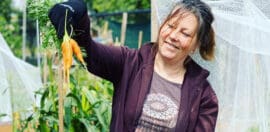Change is important for the environment. But why is it so hard to do?

10 June 2020 at 1:38 pm
While 2020 is about to go down as one of our most challenging years, it’s also proving to be a time for self-reflection. Harvey’s COO Simon Smallchua has been using the space to think more about his family’s impact on the planet and what we can all do to make things a bit better.
Seen the news lately? Clue: it’s not great. It feels a bit like the planet is breaking. Bushfires, extreme poverty, self-isolation and the dreaded virus – it can sometimes all feel a bit much. It’s why my family and I are trying to focus on the positive.
We’re looking around at scientists and companies constantly innovating, we’re noticing that more and more businesses are adopting clean energy and there’s a feeling of global connectedness and a groundswell of people wanting to help fix things. I’m one of them.
As we’ve watched 2020 unfold, my wife and I have spent time becoming more informed about the impact of our personal decisions on global environmental/social issues. And because we also own and run Harvey together, we’re on a mission to improve both our personal and professional impact on the planet.
But I’m new to this whole thing. If there was a spectrum of social/environmental action I’d sit somewhere towards the bottom end, but as purpose-driven business owners and environmentally-conscious individuals, we’re committed to trying.
We’re on a mission
We started with a list of things we wanted to change and every week we’ve been learning something new. We’re selling our second car and use (or we did pre-corona) public transport more often, switched to 100 per cent renewable energy (Powershop), partially switched to an ethical bank (Bank Australia), reduced our meat consumption and switched to chemical-free cleaning products. We buy from farmers markets, have stopped buying stuff we don’t need and, where possible, are buying ethically.
We’re definitely making progress but it’s nowhere near as fast as we’d like.
Is being slow to change normal?
When I look at how far we’ve come I know that we’re doing more than the average Aussie. Yet we don’t feel like we’re doing enough and the “to do” list keeps getting bigger.
We wanted to replace our Subaru Forester with a low-consumption car, move near a train station and use public transport almost entirely. We want to offset our carbon emissions, move all our banking to an ethical bank, halve our energy consumption, fly less, only shop sustainably, grow our own vegetables, make our house energy efficient and get solar. The list goes on.
So, are we suffering from activist overwhelm? And what should we do?
The answer is yes. And recognising the overwhelm was our first step to changing our perspective and learning to tackle a huge issue like this one step at a time. We all know that Rome wasn’t built in a day.
So, here’s how we’re doing it:
Inspired by Lily Dempster from One Small Step (an advocate for positive behaviour change) we’re feeling empowered and motivated.
- Instead of feeling bad about what we’re not doing, we’re focused on what we’re managing to do right here, right now. A big help was watching the 2040 documentary and seeing that there was a path available to a positive future.
- Rather than thinking, and feeling, that the problem is too big and that our impact is meaningless we’ve been breaking things down into smaller actions. By starting with areas we know how to change (ethical banking, solar panels, less meat etc) we feel like we have a small piece of control over our choices.
- Educating ourselves. You can only change what you know and so we’ve started there – but we’re continuing to delve deeper into the problem and adapting things as we go.
- We’re being kinder to ourselves. The human capacity to change is limited and we only have 10 per cent of our brains available for creativity, self-reflection and change. The other 90 per cent of our brain is busy protecting us from danger, keeping us on our feet and doing our day-to-day activities. We’re using that 10 per cent wisely, consciously and doing our best to not get overwhelmed.
So what?
Well we think the more we all focus on positive behaviours, celebrate the wins and progress, the more people will be motivated to do good. Whether it’s individuals, governments, NGOs or businesses, there is a rapidly growing desire for a better future – let’s make it attainable and actionable today!







